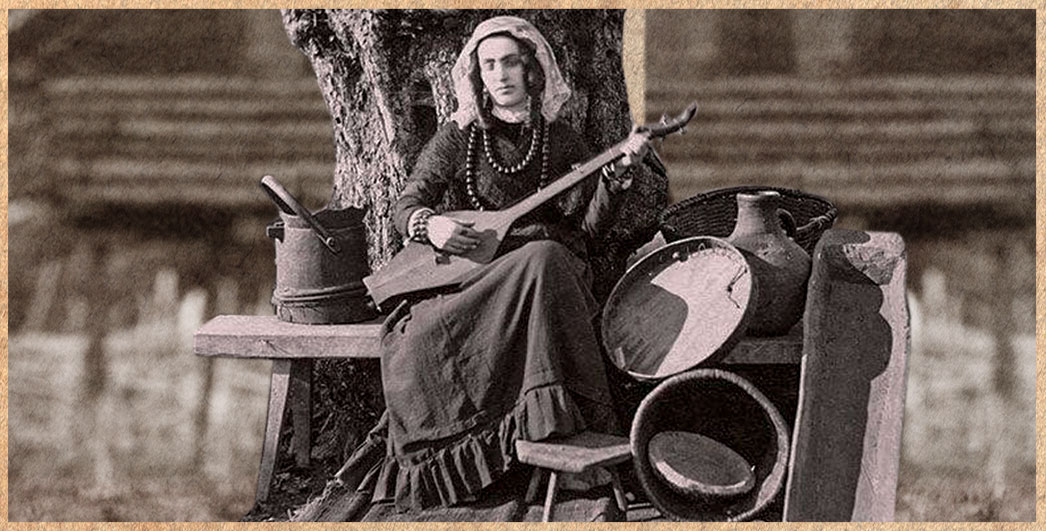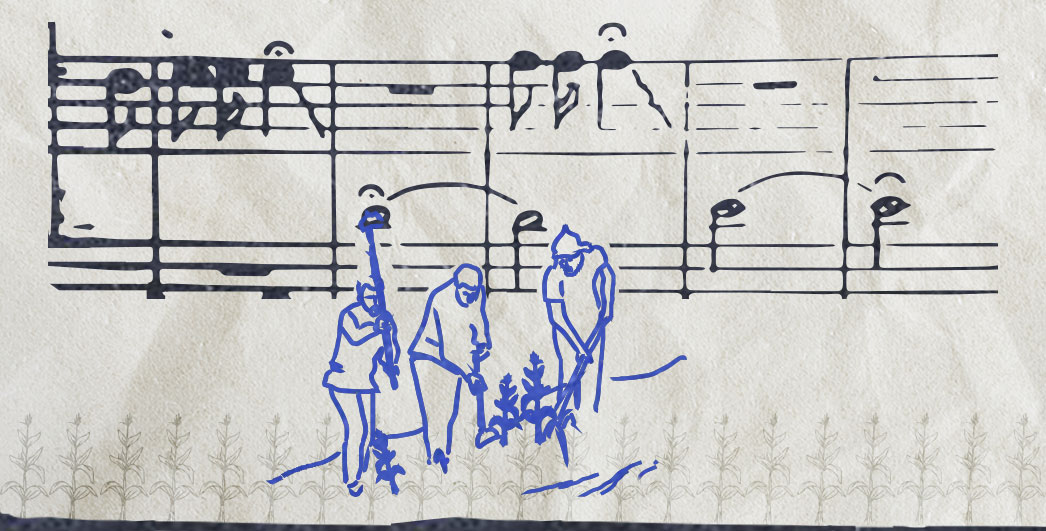What Did Stravinsky Really Say about Georgian Music?
If you search for the phrases “Igor Stravinsky” and “Georgian music” on Google, you are likely to see more than 30,000 results. Some of the sites merely mention Stravinsky in passing, noting the composer’s fascination or admiration for Georgian music, while others include quotations supposedly from Stravinsky himself. Goodreads, a social media site where users upload book reviews and share their favorite quotations, has pages for the two comments most often attributed to Stravinsky: “Georgian folk music has more new musical ideas than all the contemporary music,” and the claim that the distinctive Gurian k’rimanch’uli yodel is “the best song which I have ever heard.” Versions of these two statements are ubiquitous in Georgian music circles, cited in scholarly articles and recycled in concert programs and liner notes. The unfortunate fact is that Stravinsky said neither of these things. Nevertheless, the quotations were not fabricated out of thin air, and tracking down what Stravinsky did have to say about Georgian music—and how his remarks were distorted over time—is a revealing story in and of itself.
Igor Stravinsky (1882–1971) was undoubtedly one of the great composers of the twentieth century—but he was also a genius at self-promotion. At the height of his fame, in 1920s Paris, he was a constant presence at high-society events, his concerts attended by all the famous writers and artists of the day. (1) He loved being interviewed, sharing his opinions on current events, praising or disparaging the work of fellow composers, and discussing his own compositions in ways that would shape their interpretation for years to come.

This love of press coverage continued well into his old age, which he spent as a citizen of the United States, having emigrated from France in 1939. One favorite publication in his later years was the New York Review of Books, a magazine founded in 1963, which featured at least eight interviews with Stravinsky between 1965 and the composer’s death in 1971. In one of these, published on May 12, 1966, Stravinsky briefly discussed music from Georgia.

His comments, which have led to years of misquotation and misconception, are worth considering in full:
One of the two most impressive recent musical experiences—the other was [Schoenberg’s] Jacob’s Ladder—I owe to the late Noah Greenberg and the tapes of polyphonic singing recorded by him in mountain villages near Tiflis. Greenberg’s discovery of an active performing tradition of music ranging from tenth-century conductus and organum to High Renaissance was a major find, I think, contributions to performance knowledge being even more valuable than acquisitions of more music […]. The yodeling, called Krimanchuli in Georgian, used in the performance of trecento hockets, is the most virile vocal performance I have ever heard. Needless to say, this exhumed treasure, being both foreign and religious in origin and therefore embarrassing to progressive historicism, and polyphonic and therefore subversive, is unwelcome in the Soviet Union and unlikely to be preserved. No doubt it will be plowed under again for good, and replaced by Moscow-manufactured party-slogan songs. The decline of culture in musical terms—if you will excuse a bit of my own historicism—is the devolution from polyphony to monophony. (2)
We will see in a moment how these remarks have traveled and transformed, until they became generic clichés praising Georgian music, but let us first try to understand them in their original context.
Noah Greenberg, whom Stravinsky mentions in the first sentence, was a choral conductor most famous for founding the ensemble New York Pro Musica, which helped pioneer the performance and recording of “early music” from the medieval and renaissance periods.

Greenberg and his group went on a concert tour to the USSR in 1964, during which Greenberg likely made the tape recordings referenced by Stravinsky. There are multiple references in this passage to genres of European music, all of them from historical periods of interest to Greenberg: conductus and organum, considered early medieval forms of sacred polyphony; and trecento (i.e., fourteenth-century) hockets, referring to the practice of breaking up a melody into shorter rhythmic units and distributing the phrases within an ensemble. Let us leave aside for the time being the accuracy of Stravinsky’s account, which has multiple issues: k’rimanch’uli, for instance, is native to western Georgia, quite far from “the mountain villages near Tiflis,” and no knowledgeable listener or scholar would consider the k’rimanch’uli yodel to be a hocket. For within this passage are the seeds of the quotations that would one day fill the internet. But the path from Stravinsky’s interview to a website with inspirational quotes has an important intermediary step: the pages of a Soviet music journal.
When he discusses music of the Middle Ages and Renaissance, Stravinsky, on the one hand, is building on a longstanding tradition of comparing Georgian music to historical European polyphony. At the same time, however, he is making a pointed political statement. He sees the supposed antiquity of Georgian music—preserving, unchanged, a medieval sacred tradition—as a rebuke of Soviet cultural policies. The complex polyphony of Georgian sacred music, Stravinsky seems to be saying, disproves the dogmatic position that advancement in culture could only come about by leaving behind the shackles of religious supersition and accepting the progressive vision of the Soviet state. Suppressing this kind of music, Stravinsky suggests, would be akin to “the devolution from polyphony to monophony,” an impoverishment of musical culture in favor of monolithic communist ideology.
Imagine his surprise, then, when his words were reprinted later that year in Sovetskaia Muzyka, the official journal of the Union of Soviet Composers.

Translated into Russian by a young musicologist and composer, Mark Podberezsky, Stravinsky’s remarks appear in much abridged form, stripped of their anti-Soviet message:
One of the important musical impressions was recordings of Georgian folk polyphonic singing made in mountain villages near Tbilisi. This is a tradition of active musical performance dating back to antiquity, a magnificent discovery that can give more for performance than all the acquisitions of new music ... (3)
This article, not the original New York Review of Books interview, is the true source of the ubiquitous Stravinsky quotations, especially the one favorably comparing Georgian folk music to contemporary music. Whereas in the original English, Stravinsky had said that learning about “performance knowledge” can be more important than “acquisitions of more music,” here he is quoted as saying that this particular tradition—Georgian folk polyphony—is more significant than “all the acquisitions of new music.” Nowhere had Stravinsky said anything about “contemporary” or “modern” music: he was simply comparing the value of acquiring more music versus learning about performance practices from different places and time periods. Likewise, Stravinsky’s comment about k’rimanch’uli being “the most virile vocal performance I have ever heard” was eventually transformed into a much more expansive statement: that it was simply “the best song I have ever heard.” In both cases, Stravinsky’s context-specific admiration for some aspect of Georgian music was inflated and universalized, producing quotable statements of unbelievably high praise.
One individual who may have unintentionally spread these misquotations was the great singer and choirmaster Anzor Erkomaishvili. Never claiming to be a scholar himself, Erkomaishvili was concerned above all with popularizing Georgian traditional music, both within the USSR and beyond. In 1966, when the Russian translation of Stravinsky’s interview appeared in Sovetskaia Muzyka, Erkomaishvili was still a student at the Tbilisi State Conservatoire. He may have read the interview himself or heard about it secondhand, and in either case would not have had access to the American magazine to check the translation’s accuracy. In any event, he latched on to the Russian versions of Stravinsky’s quotations and used them frequently when promoting performances and recordings by the Rustavi Ensemble. In 1990, for instance, when Rustavi performed in San Diego, California, he gave an interview to the Los Angeles Times, in which he paraphrased Stravinsky, reporting that the composer had said that “Georgian folk music has more new musical ideas than all the contemporary music.” (4) The internet is never good at properly attributing quotations, and although Erkomaishvili never claimed to be quoting Stravinsky verbatim, that Los Angeles Times article is often cited now as a presumably authoritative source for Stravinsky’s comments. Over the years, Erkomaishvili would make some other minor mistakes, like saying that Stravinsky’s interview appeared in a journal called America, in December 1967. (5) (A Catholic journal titled America did indeed feature an interview with Stravinsky in 1963, though it does not include discussion of Georgian music.) (6)
All of this, however, is not to lay blame wholly on Anzor Erkomaishvili for the enduring popularity of the misquotation—it was the responsibility of scholars, whether in Georgia or beyond, to trace the words back to their source. Instead, the mistranslated passage from Sovetskaia Muzyka appeared in Ted Levin’s liner notes to the Rustavi Ensemble’s first US release, the 1989 compilation album Georgian Voices (7), which has been cited in turn by many other scholars. At no point in all these years did anyone bother looking up what Stravinsky actually said. The story was too good: the twentieth century’s arch-modernist, awed and fascinated by Georgian singing, recognizing it as a musical phenomenon on par with his own complex creations.
There is no doubt that Stravinsky had considerable interest in and admiration for Georgian traditional music, both sacred and secular. In his archive, there are clippings of newspaper articles about Georgian chant and copies of published scores by Ia Kargareteli and others. (8) Richard Taruskin, the late American musicologist who discovered these items among Stravinsky’s papers, has even suggested that Georgian harmony may have influenced parts of Stravinsky’s ballet-cantata Les Noces (Svadebka). It is one thing, however, to recognize specific aspects of Georgian music as a potential source of inspiration for a great composer; it is another thing entirely to twist that composer’s words into a blanket endorsement of Georgian folk music as a whole. In the end, Georgian music deserves better representation than these misquotations. There is likely no changing the reality of trying to make and sell music in an increasingly compressed global economy—it makes sense as a promotional strategy to name-drop someone like Stravinsky—nor is it likely that these words of praise, spoken by a Russian no less, will stop being cited as “proof” of the superiority of Georgian music. The truth is that Georgian singers and scholars don’t need an authority figure like Stravinsky to argue for their music’s worth: their own voices are eloquent enough.
References
- 1.Ross, Alex. 2007. The Rest is Noise: Listening to the Twentieth Century. New York: Picador, 88–89.
- 2.Stravinsky, Igor. 1966. “Stravinsky on the Musical Scene and Other Matters.” New York Review of Books, May 12, 1966. https://www.nybooks.com/articles/1966/05/12/stravinsky-on-the-musical-scene-and-other-matters/
- 3.“Interv’iu s I. Stravinskim.” Sovetskaia muzyka, no. 12 (337) (1966): 131–33.
- 4.Sondak, Eileen. 1990. “Georgian Troupe Out to Reconquer S.D. Audiences: Rustavi Company’s Distinctive Style Spurs Strong Advance Sale of Tickets for Symphony Hall Performances.” Los Angeles Times, February 26, 1990.
- 5.Aleksinskaia, Marina. “Mir nam!” Zavtra, April 26, 2013. https://zavtra.ru/blogs/mir-nam.
- 6.“Interview with Stravinsky.” America 109, no. 9 (1963): 219–20.
- 7.Levin, Ted. 1989. Liner notes to Rustavi Ensemble: Georgian Voices. New York: Electra Nonesuch (CD 79224-2).
- 8.Taruskin, Richard. 1997. Defining Russia Musically: Historical and Hermeneutical Essays. Princeton, NJ: Princeton University Press, 427.




